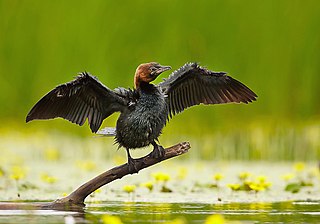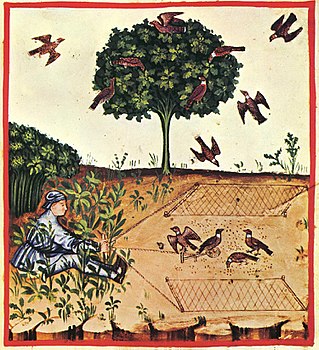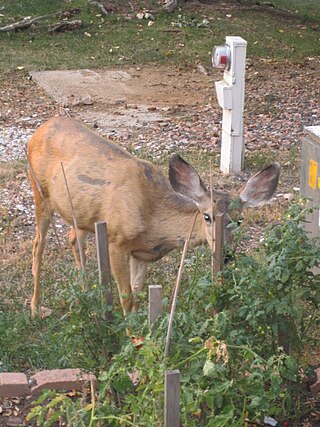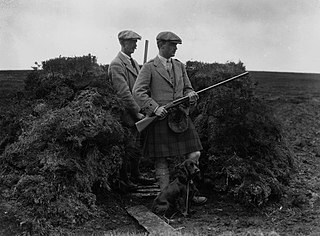Related Research Articles

The ortolan, also called ortolan bunting, is a Eurasian bird in the bunting family Emberizidae, a passerine family now separated by most modern scholars from the finches, Fringillidae. The genus name Emberiza is from Alemannic German Embritz, a bunting. The specific name hortulana is from the Italian name for this bird, ortolana. The English ortolan is derived from Middle French hortolan, "gardener".

Oology is a branch of ornithology studying bird eggs, nests and breeding behaviour. The word is derived from the Greek oion, meaning egg. Oology can also refer to the hobby of collecting wild birds' eggs, sometimes called egg collecting, birdnesting or egging, which is now illegal in many jurisdictions.

The yellow-throated vireo is a small American songbird.

The pygmy cormorant is a member of the Phalacrocoracidae (cormorant) family of seabirds. It breeds in south-eastern Europe and south-western Asia. It is partially migratory, with northern populations wintering further south, mostly within its breeding range. It is a rare migrant to western Europe.

Akrotiri and Dhekelia, officially the Sovereign Base Areas of Akrotiri and Dhekelia (SBA), is a British Overseas Territory on the island of Cyprus. The areas, which include British military bases and installations that were formerly part of the Crown colony of Cyprus, were retained by the British under the 1960 treaty of independence signed by the United Kingdom, Greece, Turkey and representatives from the Greek and Turkish Cypriot communities. The territory serves as a station for signals intelligence and is thereby part of the United Kingdom's surveillance-gathering work in the Mediterranean and the Middle East.

The red-billed quelea, also known as the red-billed weaver or red-billed dioch, is a small—approximately 12 cm (4.7 in) long and weighing 15–26 g (0.53–0.92 oz)—migratory, sparrow-like bird of the weaver family, Ploceidae, native to Sub-Saharan Africa.

Drift netting is a fishing technique where nets, called drift nets, hang vertically in the water column without being anchored to the bottom. The nets are kept vertical in the water by floats attached to a rope along the top of the net and weights attached to another rope along the bottom of the net. Drift nets generally rely on the entanglement properties of loosely affixed netting. Folds of loose netting, much like a window drapery, snag on a fish's tail and fins and wrap the fish up in loose netting as it struggles to escape. However, the nets can also function as gill nets if fish are captured when their gills get stuck in the net. The size of the mesh varies depending on the fish being targeted. These nets usually target schools of pelagic fish.

Waterfowl hunting is the practice of hunting aquatic birds such as ducks, geese and other waterfowls or shorebirds for sport and meat. Waterfowl are hunted in crop fields where they feed, or in areas with bodies of water such as rivers, lakes, ponds, wetlands, sloughs, or coasts. There are around 3 million waterfowl hunters in the United States alone.

Birdlime or bird lime is an adhesive substance used in trapping birds. It is spread on a branch or twig, upon which a bird may land and be caught. Its use is illegal in many jurisdictions.

Animal trapping, or simply trapping or ginning, is the use of a device to remotely catch and often kill an animal. Animals may be trapped for a variety of purposes, including for meat, fur, sport hunting, pest control, and wildlife management.

Nuisance wildlife management is the selective removal of problem individuals or populations of specific species of wildlife. Other terms for the field include wildlife damage management, wildlife control, and animal damage control. Some wild animal species may get used to human presence, causing property damage or risking the transfer of diseases (zoonoses) to humans or pets. Many wildlife species coexist with humans very successfully, such as commensal rodents which have become more or less dependent on humans.

Forestry in India is a significant rural industry and a major environmental resource. India is one of the ten most forest-rich countries of the world. Together, India and 9 other countries account for 67 percent of the total forest area of the world. India's forest cover grew at 0.20% annually over 1990–2000, and has grown at the rate of 0.7% per year over 2000–2010, after decades where forest degradation was a matter of serious concern.

The wildlife of Cyprus includes its flora and fauna and their natural habitats. Cyprus has a rich flora and a diverse fauna albeit with relatively few mammals. Like most modern countries, the natural habitats in Cyprus have been steadily disappearing, currently retaining only 20% of its original habitat due to rapid urbanization, usage of forests for commercial purposes, tourism and various other reasons. One of the features of Cyprus' habitats is the wild and sharp differences in elevations and habitats on the island as well as climate, all of which supply a diverse habitat for an array of fauna and flora. Terra Cypria was established as a trust in 1992 to conserve the Cypriot environment and its biodiversity.

Driven grouse shooting is a field sport in the United Kingdom involving the shooting of red grouse. It is one of two forms of the sport, the other is walked-up shooting. Driven grouse shooting involves grouse being driven to fly over people with shotguns in fixed positions. In walked-up shooting the participants walk forward in a line and flush the birds as they go. Walked-up shooting is more physically demanding than a driven shoot and typically involves fewer birds being shot.

Bird trapping techniques to capture wild birds include a wide range of techniques that have their origins in the hunting of birds for food. While hunting for food does not require birds to be caught alive, some trapping techniques capture birds without harming them and are of use in ornithology research. Wild birds may also be trapped for their display in captivity in zoological gardens or for keeping as a pet. Bird trapping was formerly unregulated, but to protect bird populations most countries have specific laws and regulations.
BirdLife Cyprus (BLC) is an environmental non-governmental organisation dedicated to the conservation of birds and their habitats on the island of Cyprus in the eastern Mediterranean, for which it is the BirdLife International partner organisation. The emblem of BLC is the Cyprus wheatear, which is an endemic species.
The year 2011 in birding and ornithology.
This is a list of notable events relating to the environment in 2011. They relate to environmental law, conservation, environmentalism and environmental issues.

Many species are affected by poaching, including illegal hunting, fishing and capturing of wild animals, and, in a recent usage, the illegal harvesting of wild plant species. The article provides an overview of species currently endangered or impaired by poaching in the Americas, sub-Saharan Africa, and South-East Asia.
The year 2015 in birding and ornithology.
References
- ↑ "Αμπελοπούλια ξιδάτα". foodmuseum.cs.ucy.ac.cy (in Greek). Cyprus Food Virtual Museum. Retrieved 26 November 2015.
- 1 2 "Frontline News on Illegal Bird Trapping in Cyprus - Spring 2010". BirdLifeCyprus.org. BirdLife Cyprus. August 5, 2010. Retrieved August 12, 2010.
- ↑ Kloosterman, Karin (December 21, 2013). "Cyprus kills 1.5 million migrating songbirds to eat in fetish dish". greenprophet.com.
- 1 2 "RSPB Mass killing continues on British military base in Cyprus". BirdGuides.com. Archived from the original on 20 November 2016. Retrieved 16 March 2016.
- 1 2 "Hundreds of thousands of birds still being illegally killed on British military base in Cyprus but annual increase halted". rspb.org.uk. The Royal Society for the Protection of Birds . Retrieved 16 March 2016.
- 1 2 "No End To Cyprus Bird Toll". BBC Wildlife. Vol. 35, no. 5. 2017. p. 54.
- ↑ Morley, Nathan (June 11, 2011). "Poachers 'mafia-like' operation". Cyprus Mail . Archived from the original on July 15, 2011. Retrieved July 7, 2011.
- ↑ "Health Hazard". proact-campaigns.net. 14 February 2002. Archived from the original on 2007-09-28. Retrieved 2007-02-06.